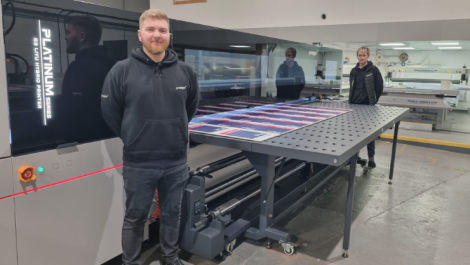The IPIA’s annual conference and networking event provided a varied programme of speakers and content addressing the theme ‘rising to the challenge – finding opportunities to grow and thrive’ in which stories and tips for success were shared, writes Michael Walker
Attracting well over 100 delegates to the event at Coventry’s Manufacturing Technology Centre, the conference programme was supported by a mini expo of print suppliers and sponsors, covering everything from finance to finishing, MIS to digital presses, and trade printers to carbon footprinters.
Opening the morning were presentations from Lance Hill of Eight Days A Week Print Solutions and Anthony Rowell of Tradeprint. Mr Hill provided detailed numerical insights into sales, net profits, margin and headcount, with all bar margins showing steady growth since 2016. He also revealed the rapid growth of sister business Eight Plus, launched in March 2022 and reaching nearly £6 million turnover in 10 months, perhaps epitomising his advice to ‘never take your foot off the gas’.
Mr Rowell explained Tradeprint’s history from an online order form and eBay store to the business bought in 2015 by Cimpress. In response to the challenges across the industry, the company expanded marketing, filled gaps in its range but also sought to improve its offer to its historic print reseller base through the introduction of Tradeprint Pro and to simplify purchasing for less experienced buyers. This also aimed to address issues in prepress that growing volumes were creating, while the importance of sustainability – both morally and financially – was also emphasised.
Delegates then heard from Elizabeth Bowerman of specialist academic and educational security printer Stephen Austin. Recapping the role of significant women in print from 1477 onward, and her own roles in the industry since 1991, Ms Bowerman then turned to the more contemporary topic of AI as part of her theme of embracing innovation and adapting to change. She pointed out that AI or other software-driven processes are already in use within print in a number of contexts, but said that it doesn’t help on its own but has a cumulative effect when applied across workflow, production processes, customer service, delivery and accounts. She also noted that it cannot replace ‘people you can trust’.
Be prepared
A panel discussion aimed to answer the question ‘is there a formula for business growth that can be identified, or is it just down to being in the right place at the right time?’. Graeme Smith, current IPIA chair, Lucy Swanston of Nutshell Creative Services, Sarah Kilcoyne-Guilliam of Kingsbury Press (now part of Bluetree Group), Adam Short of The Imaging Centre and Jamie Nelson of Compass Business Finance, gave their views and fielded questions from the audience on timing, financing, people and company culture. Whilst all acknowledged that luck does play a part, knowledge of both the printers’ in-house capabilities and customer needs are necessary preparation to seize opportunities; collaboration was also suggested as part of mutual support.
Rob Finnie of Nettl outlined the company’s progress in reacting to internet and print trends through the early 2000s and showed how the business had adapted from printing.com days, noting how previously separate roles within the franchise’s customer businesses had converged and now overlap and suggesting that supporting web, SEO and other online activity had actually led to more print being sold than when it was the only product.
Mike Hughes of direct mail house Latcham provided a candid history, starting from the days of Mail Marketing Bristol, a business run by his grandmother in the middle of the previous century, and logging the high and lows of various launches, mergers and demergers since. The influence of regulation and decisions by major players such as Royal Mail on the businesses was very apparent. As well as a rolling quarterly review and 18–24 months planning, his top tip was ‘who is more important than how’, advocating a ‘consciously incompetent’ approach in which leadership recognises that it doesn’t have all the answers, as well as the time, effort and spend that is required to break into a new market.
Rounding off the day was Simon Cooper of Solopress who complemented his arguments for a ‘trust and empowerment’ management style with a set of detailed charts and data points that not only showed increased employee satisfaction but also improved metrics on productivity – by a number of measures – plus fewer complaints and reprints.





